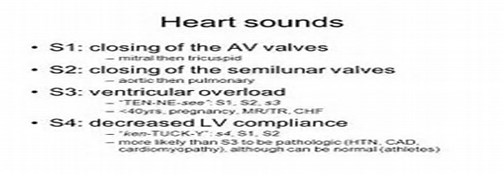An S3 heart sound is auscultated in a client in her third trimester of pregnancy. What intervention should the nurse take?
Document in the client's record.
Prepare the client for an echocardiogram.
Notify the healthcare provider.
Limit the client's fluids.
The Correct Answer is A
An S3 heart sound can be a normal finding during pregnancy due to increased blood volume and changes in cardiac output. It is known as a physiological S3 and is considered a benign finding in the absence of other concerning symptoms or signs.
In this case, there is no immediate need for intervention or concern regarding the S3 heart sound. It is not necessary to prepare the client for an echocardiogram or limit the client's fluids based solely on the presence of an S3 heart sound in the absence of other significant symptoms or complications.

Nursing Test Bank
Naxlex Comprehensive Predictor Exams
Related Questions
Correct Answer is ["A","C","D","E"]
Explanation
Certain medications can contribute to constipation as a side effect. Reviewing the client's medication list will help identify any potential medications that may be causing or exacerbating constipation.
Understanding the client's current approach to managing constipation, such as dietary changes, laxative use, or other remedies, will provide insight into their self-care practices and effectiveness of current interventions.
Diet plays a crucial role in bowel regularity. Assessing the client's dietary habits, including fiber intake and hydration, can help identify potential factors contributing to constipation.
Physical activity and exercise promote bowel regularity by stimulating intestinal motility. Evaluating the client's level of physical activity and exercise routine can provide information on their overall mobility and potential impact on bowel function.
The next scheduled visit with the healthcare provider may be important for the overall management of the client's health but may not be directly related to formulating a plan of care specifically for constipation.
Correct Answer is B
Explanation
Febuxostat is a medication used to manage hyperuricemia and prevent gout attacks. However, it has been associated with hepatotoxicity, including liver enzyme elevations and liver failure. Therefore, it is important for the nurse to instruct the client to report any signs or symptoms of liver dysfunction, such as right upper quadrant discomfort. This will allow for prompt evaluation and appropriate management if hepatotoxicity occurs.
While maintaining a healthy weight and dietary modifications may be beneficial for managing gout, specific instructions regarding protein intake should be individualized and provided by a healthcare provider or a registered dietitian.
Using an electric heating pad when pain is at its worst may provide temporary symptomatic relief for gout attacks, but it is not specific to the use of febuxostat. The focus of discharge teaching should be on medication adherence, monitoring for adverse effects, and lifestyle modifications to prevent gout attacks.
Replacing dietary table salt with salt substitutes is not a specific instruction for a client taking febuxostat. While reducing sodium intake may be recommended as part of an overall healthy diet, it is not directly related to the use of febuxostat or management of gout attacks. Dietary modifications for gout management should be individualized and based on the client's specific needs and preferences.
Whether you are a student looking to ace your exams or a practicing nurse seeking to enhance your expertise , our nursing education contents will empower you with the confidence and competence to make a difference in the lives of patients and become a respected leader in the healthcare field.
Visit Naxlex, invest in your future and unlock endless possibilities with our unparalleled nursing education contents today
Report Wrong Answer on the Current Question
Do you disagree with the answer? If yes, what is your expected answer? Explain.
Kindly be descriptive with the issue you are facing.
